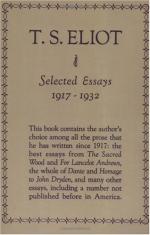|
This section contains 1,794 words (approx. 5 pages at 400 words per page) |

|
Dante Alighieri
Alighieri (1265-1321) is one of the most revered poets of the Middle Ages. His Divine Comedy, written in the common language of Florence, Italy, is a masterpiece of Catholic philosophy and poetry. His earlier work, Vita Nuova, describes Dante's idealized youthful love for a Florentine woman named Beatrice. Eliot calls Dante the most "universal" of poets because his poetry has "peculiar lucidity" (a clear and transparent beauty) and his philosophy has the benefit of a united cultural belief (influenced by St. Thomas Aquinas). Born in 1265 and raised in Florence, Dante was exiled in 1301 because of fighting between political factions in the Guelph family.
Bishop Lancelot Andrewes
Andrewes (1555-1626) held a number of important positions in the Anglican Church between 1589 and 1626. Eliot revived an interest in this distinguished scholar and linguist—whose sermons are inaccessible to most people because of their dense classical allusions—by calling...
|
This section contains 1,794 words (approx. 5 pages at 400 words per page) |

|




